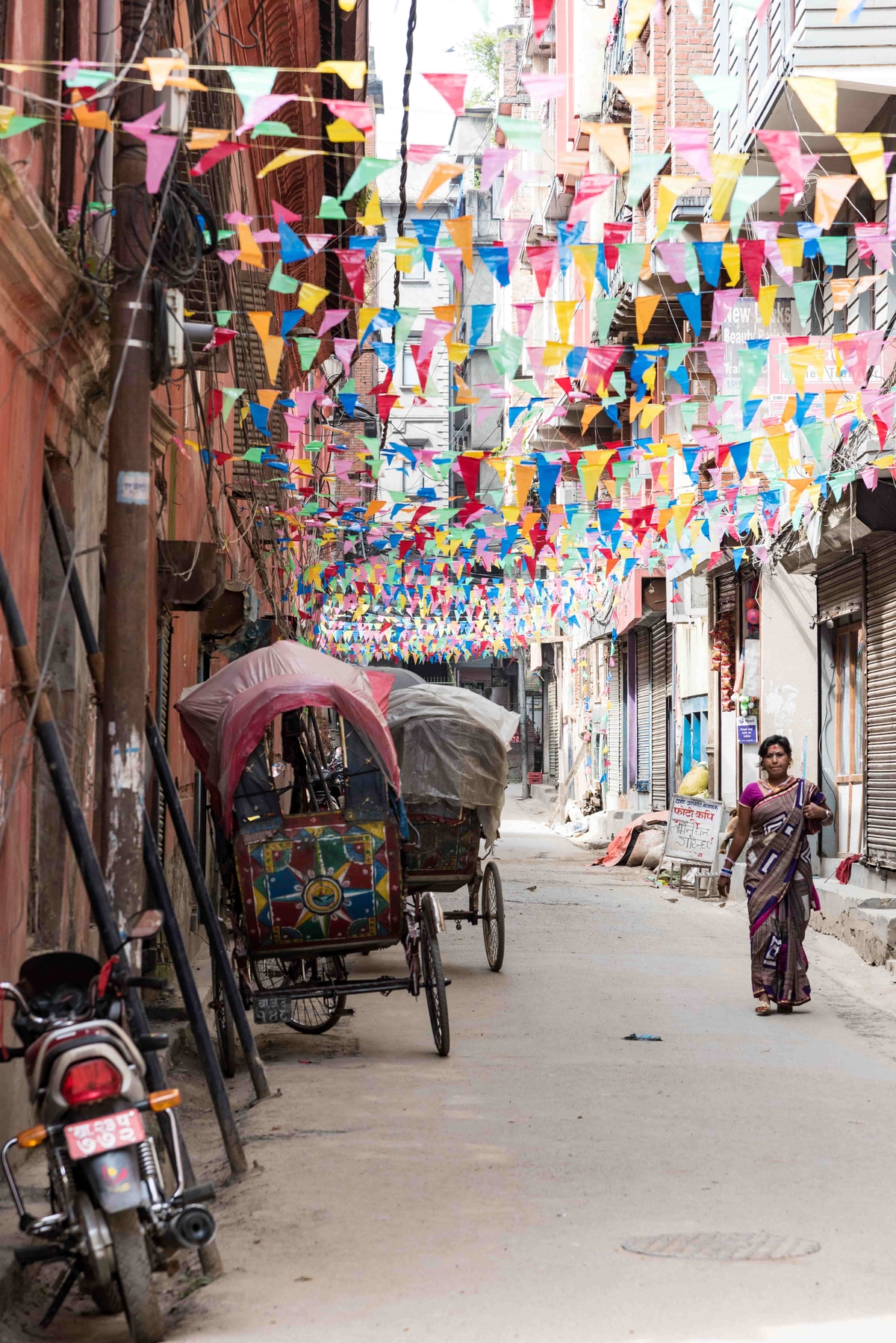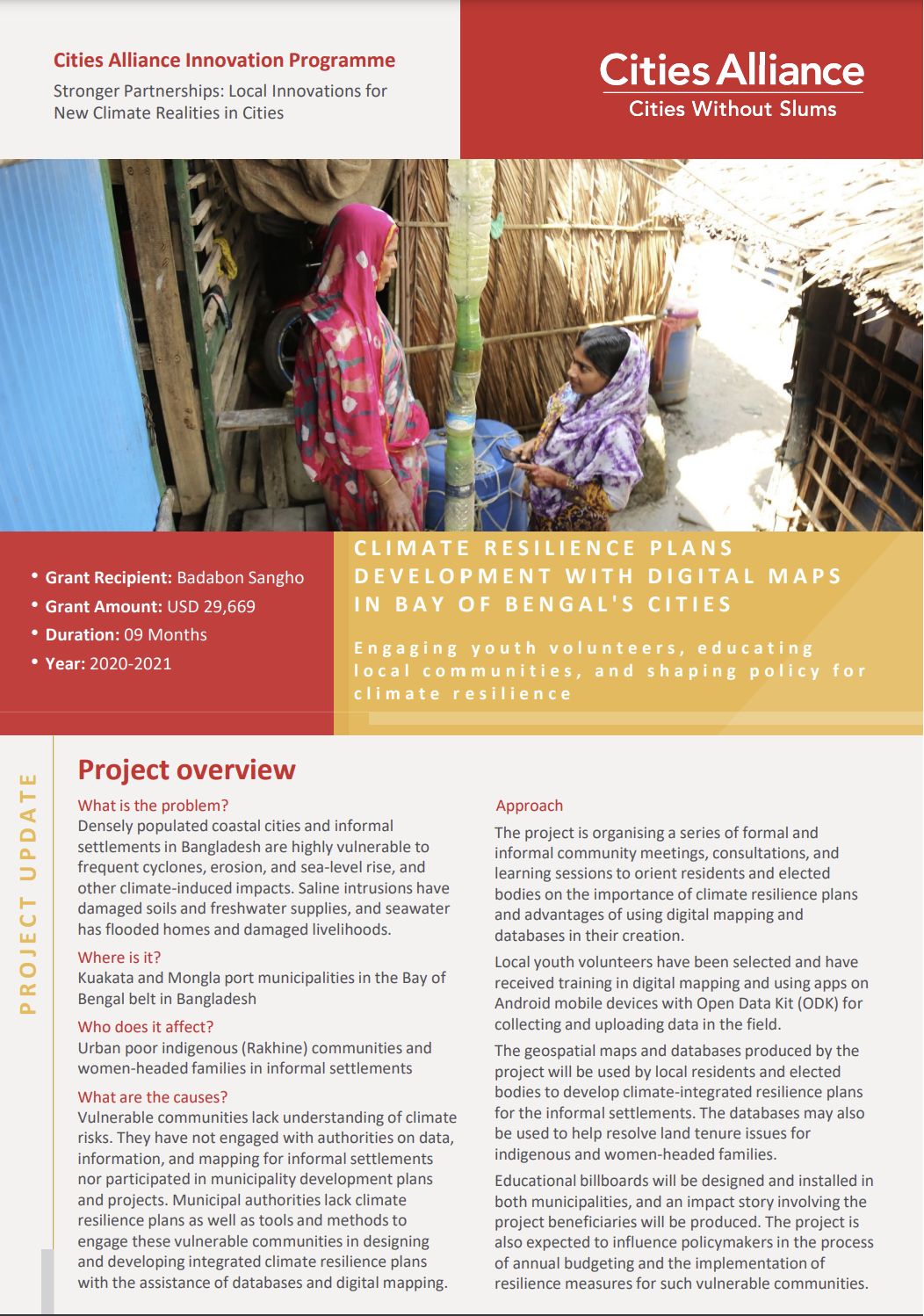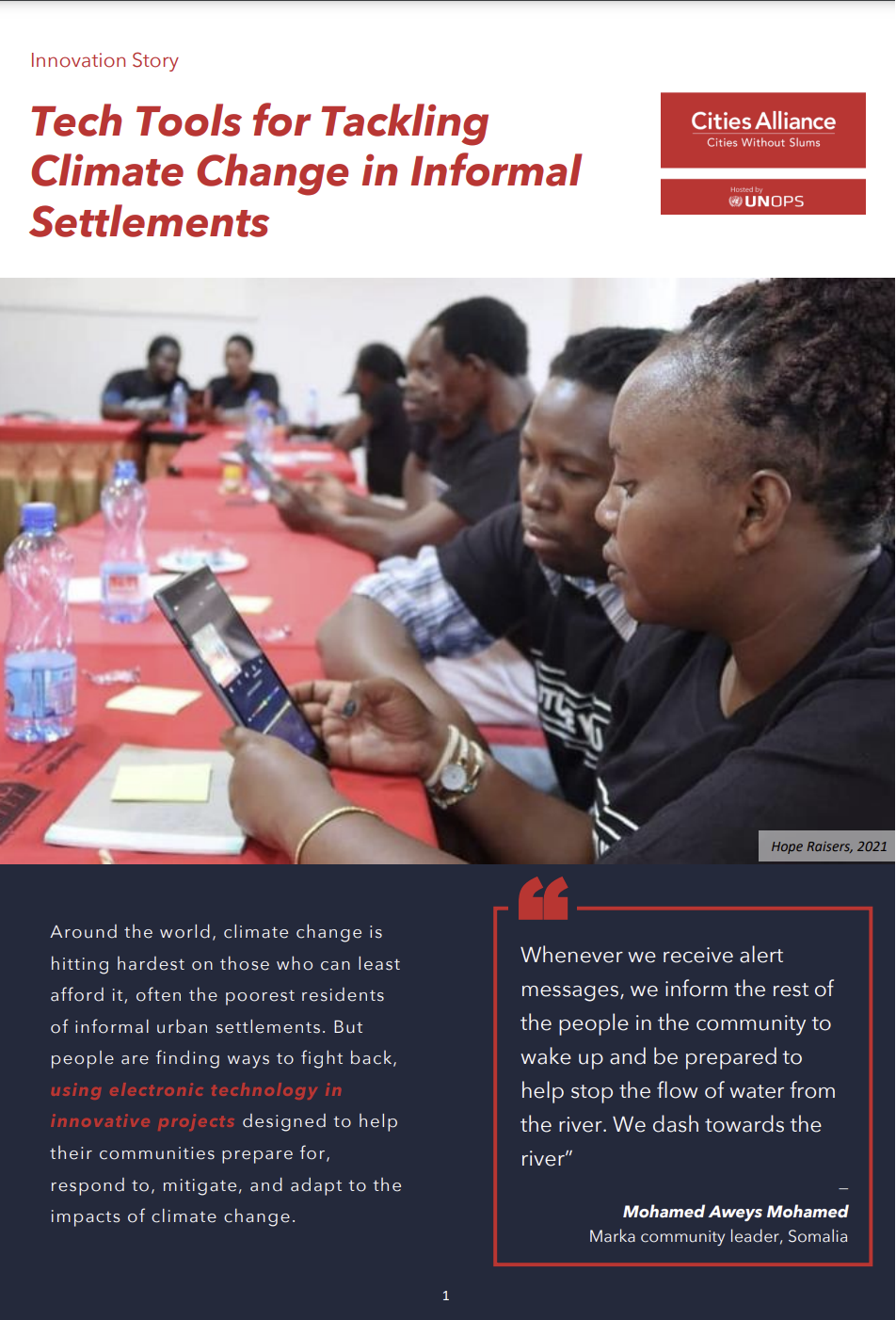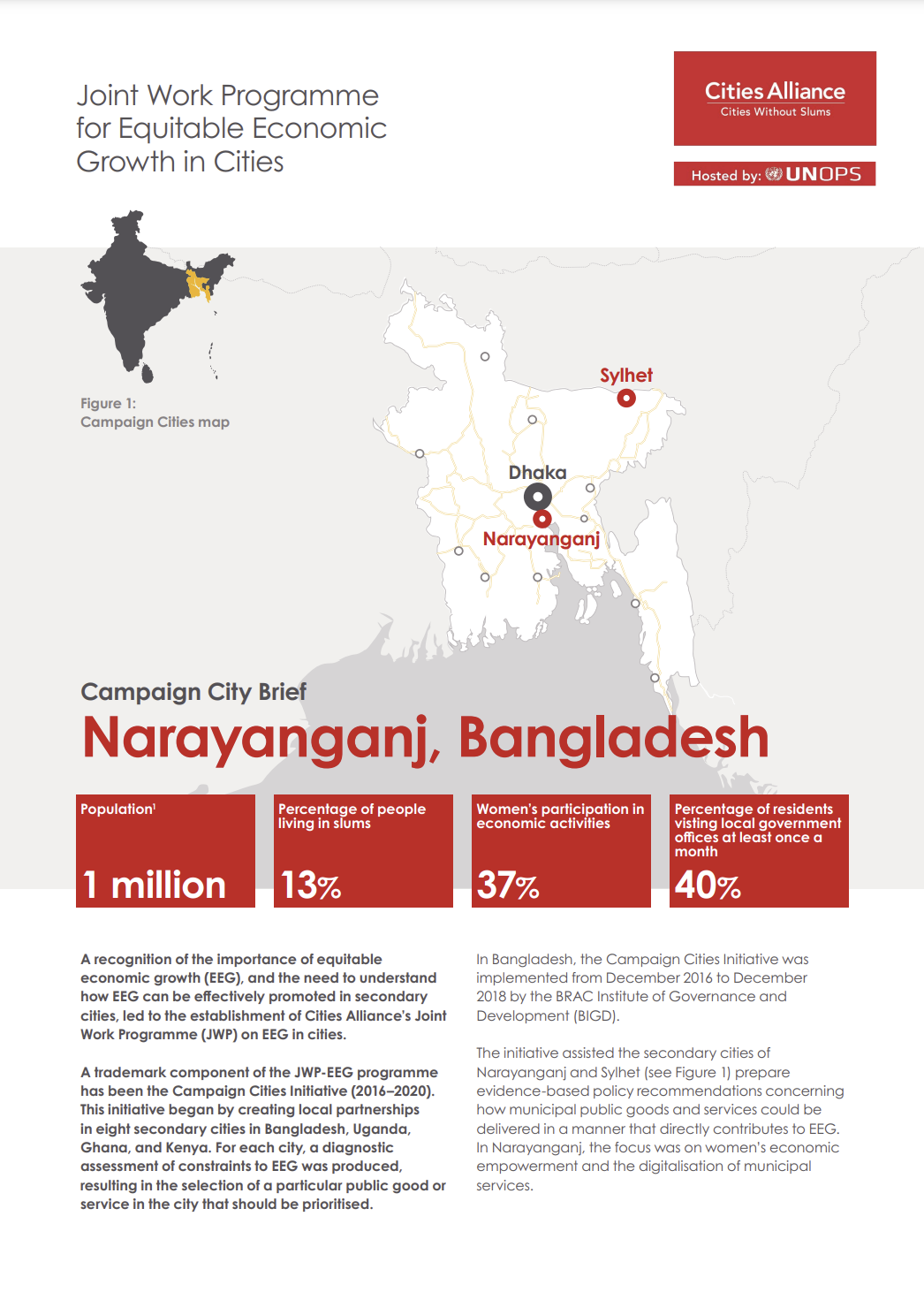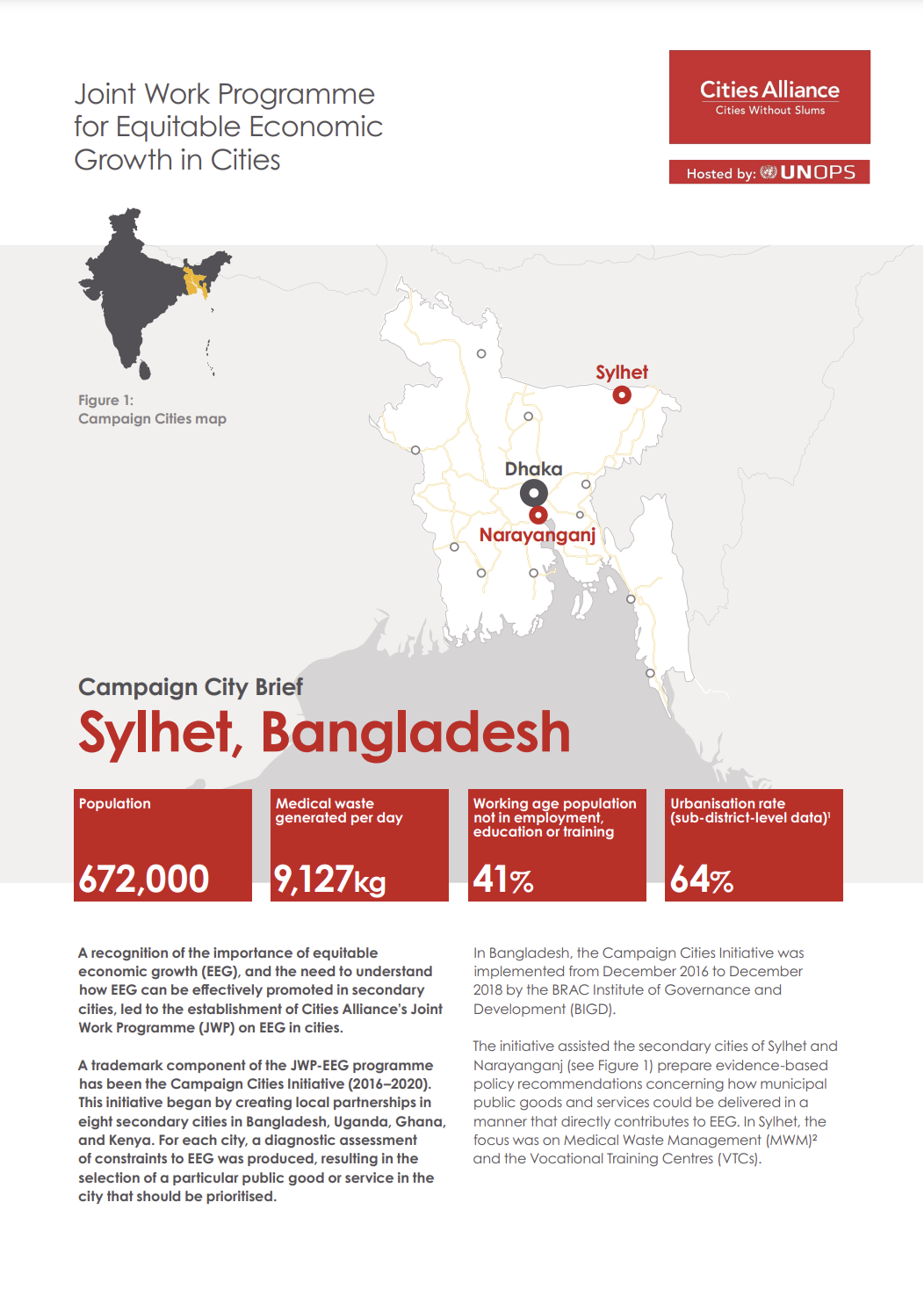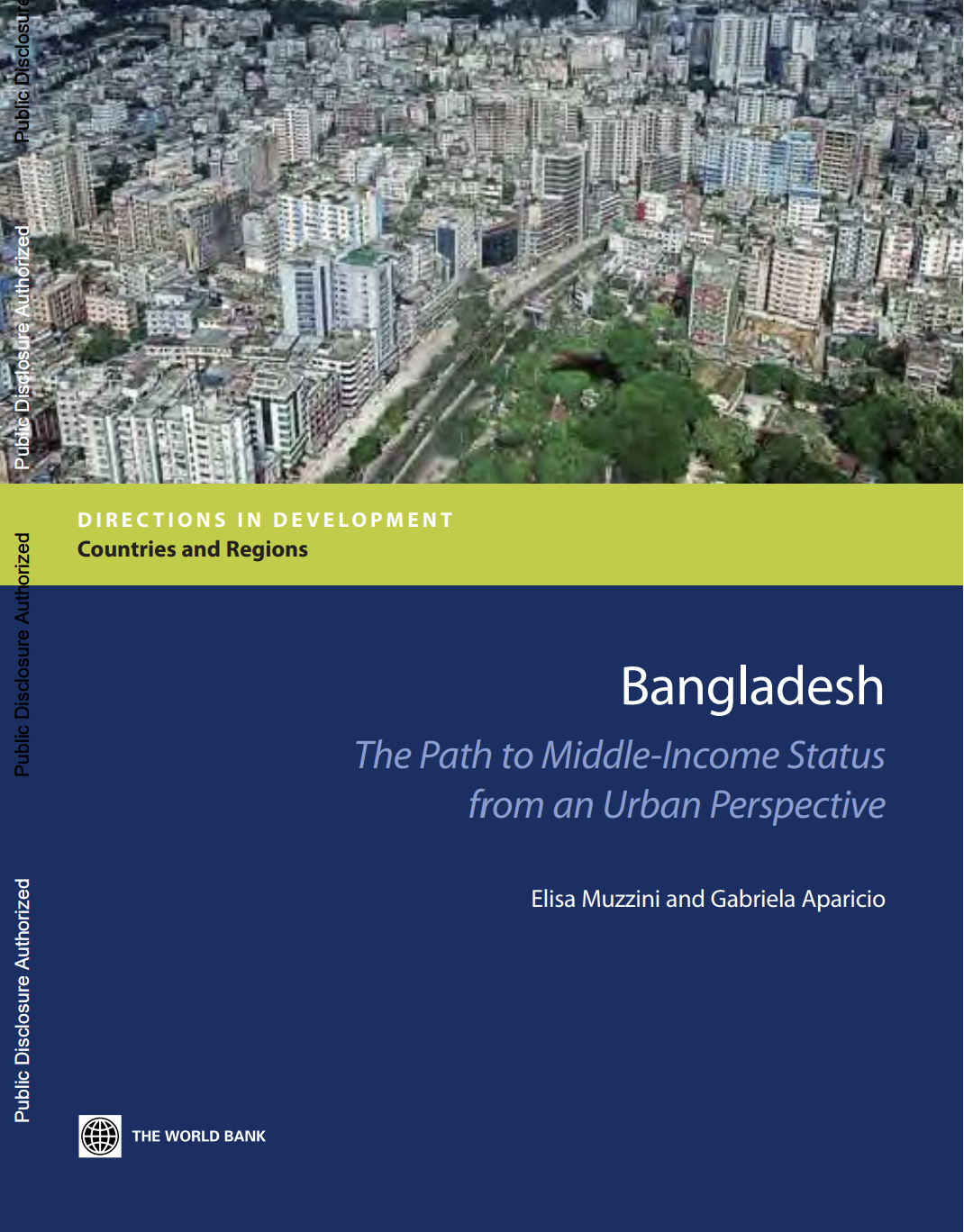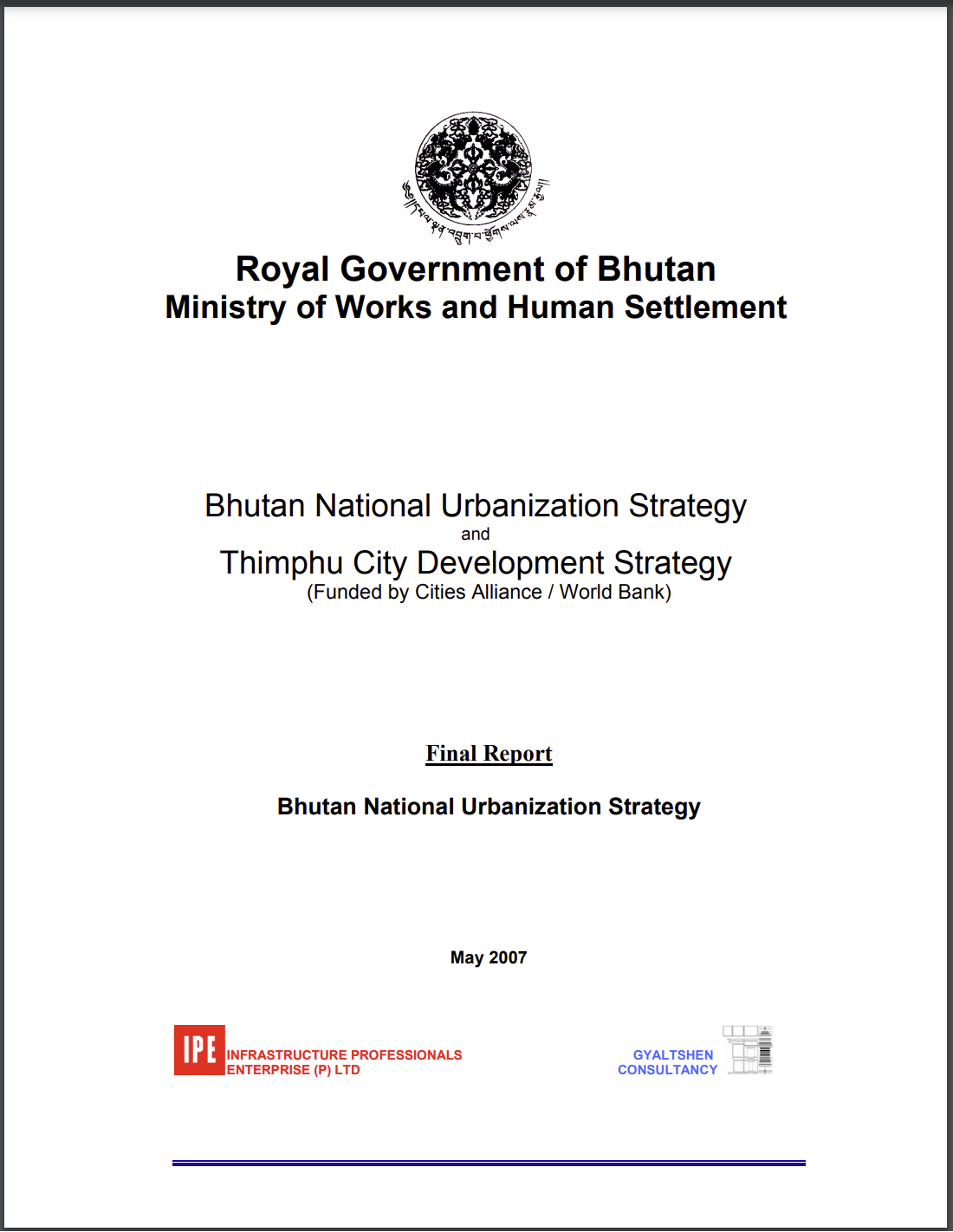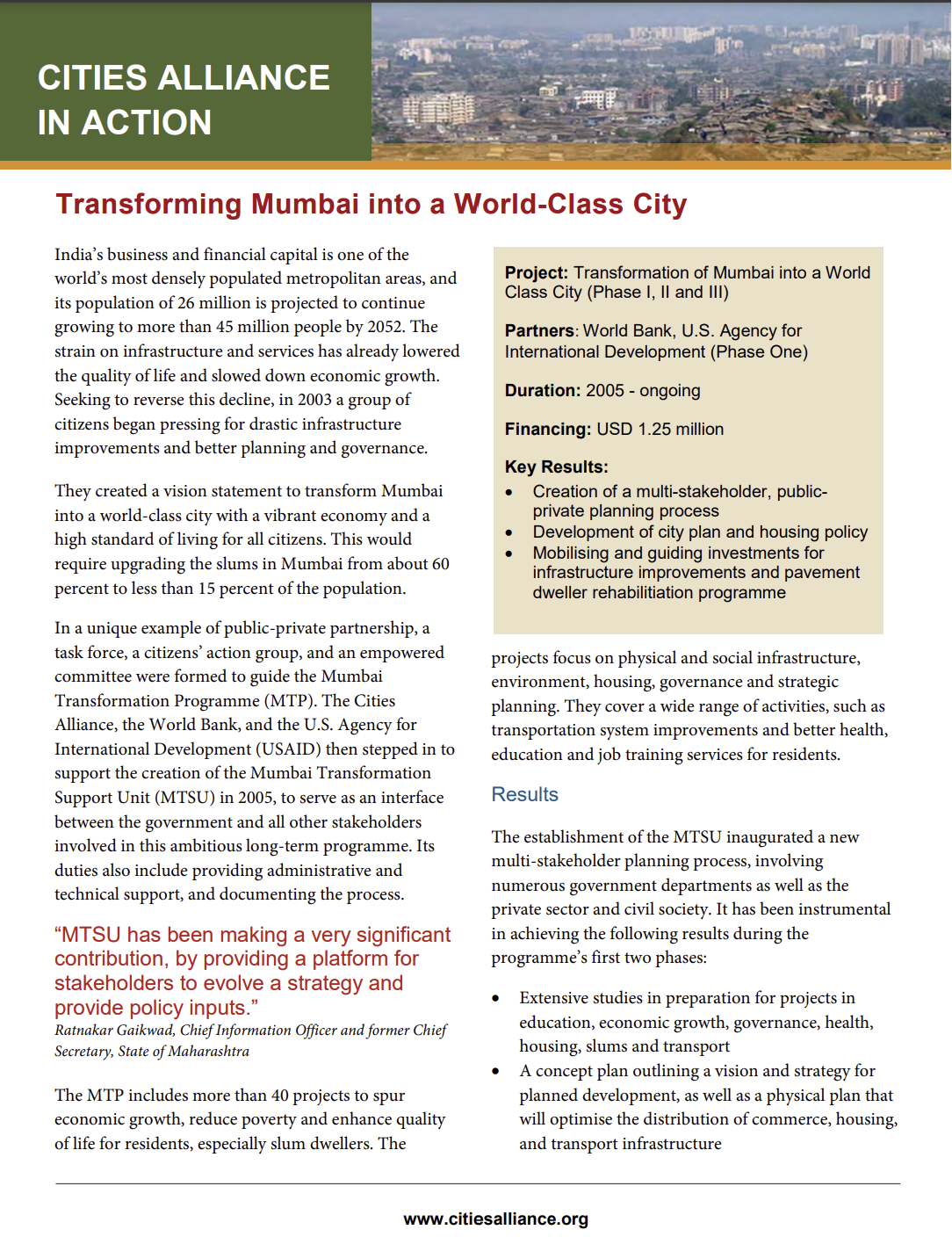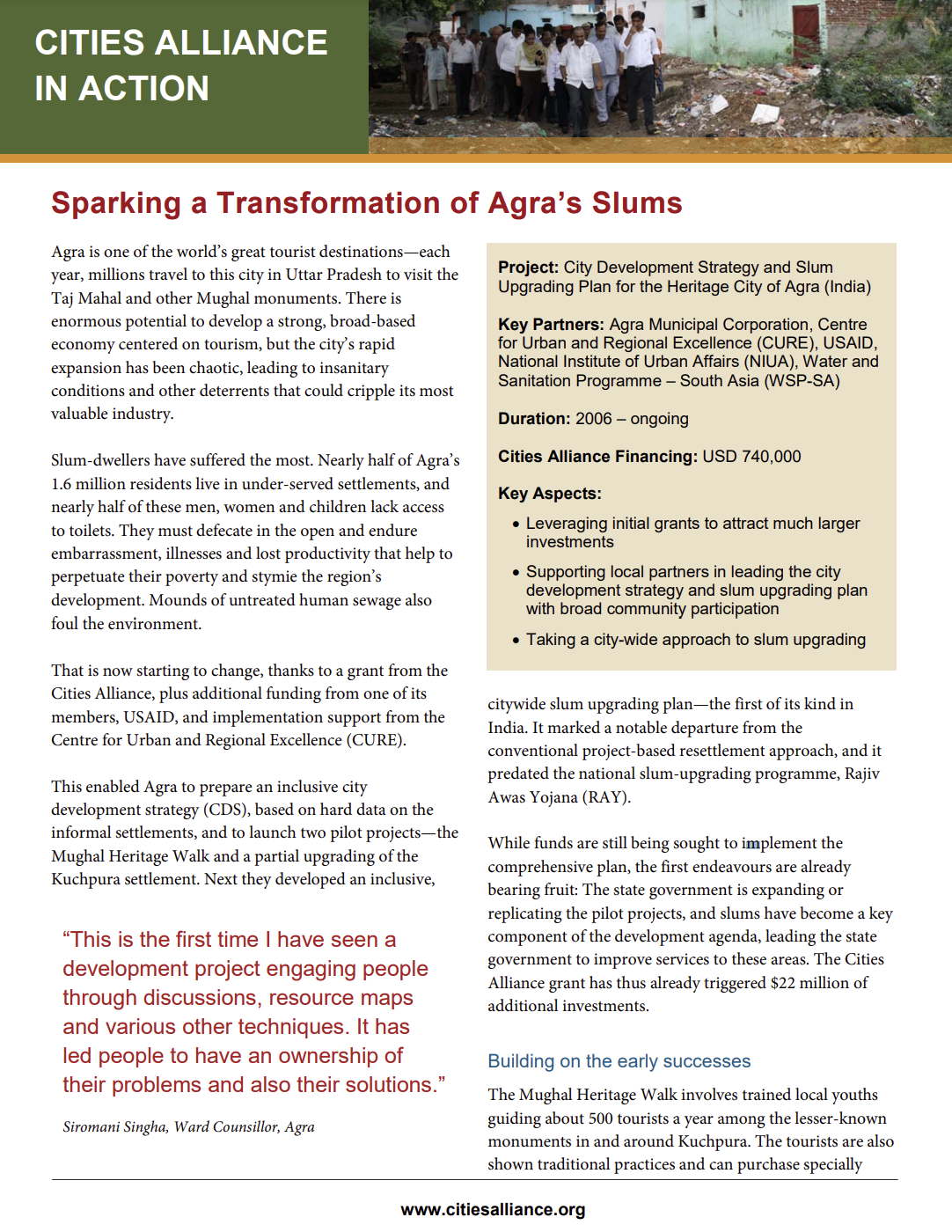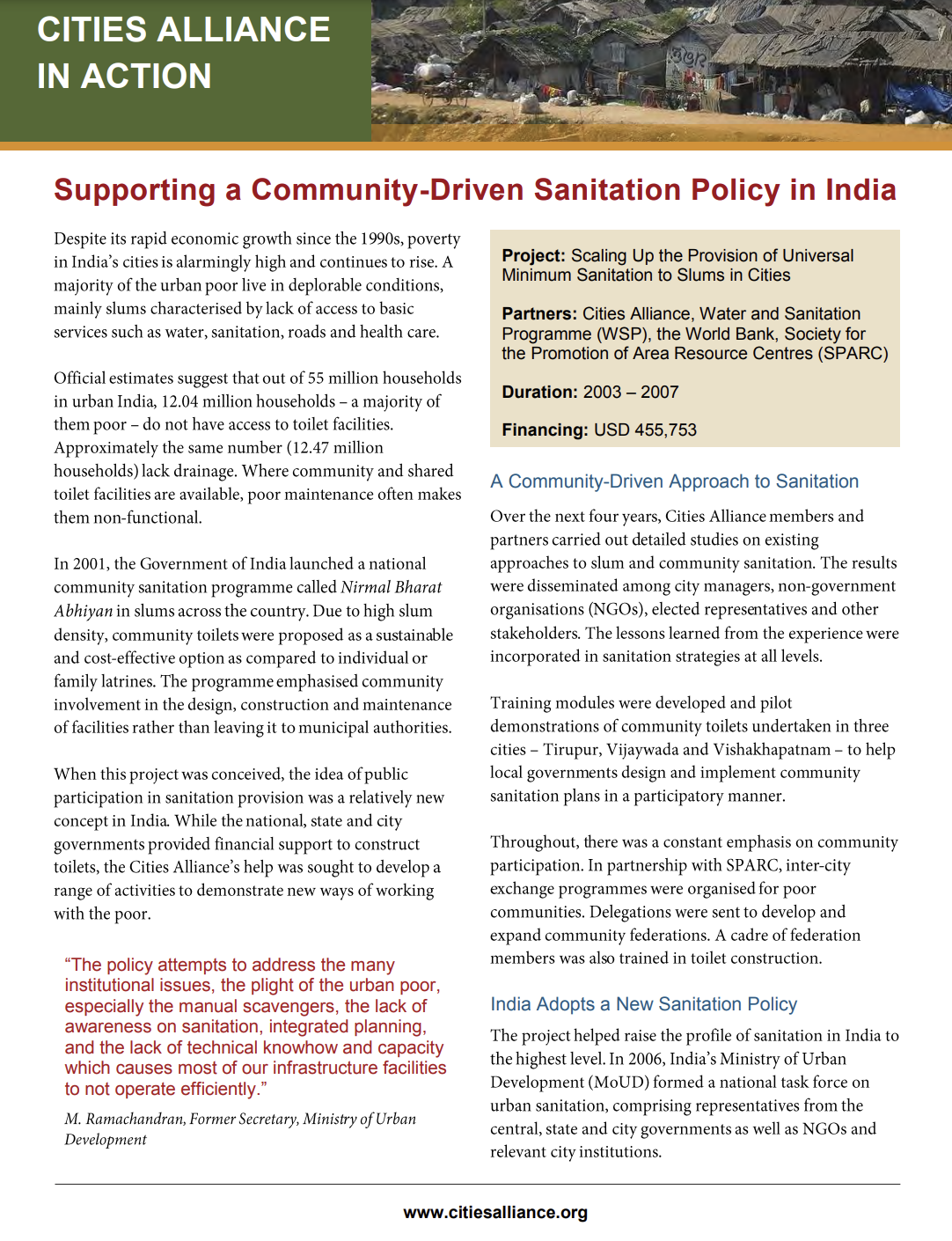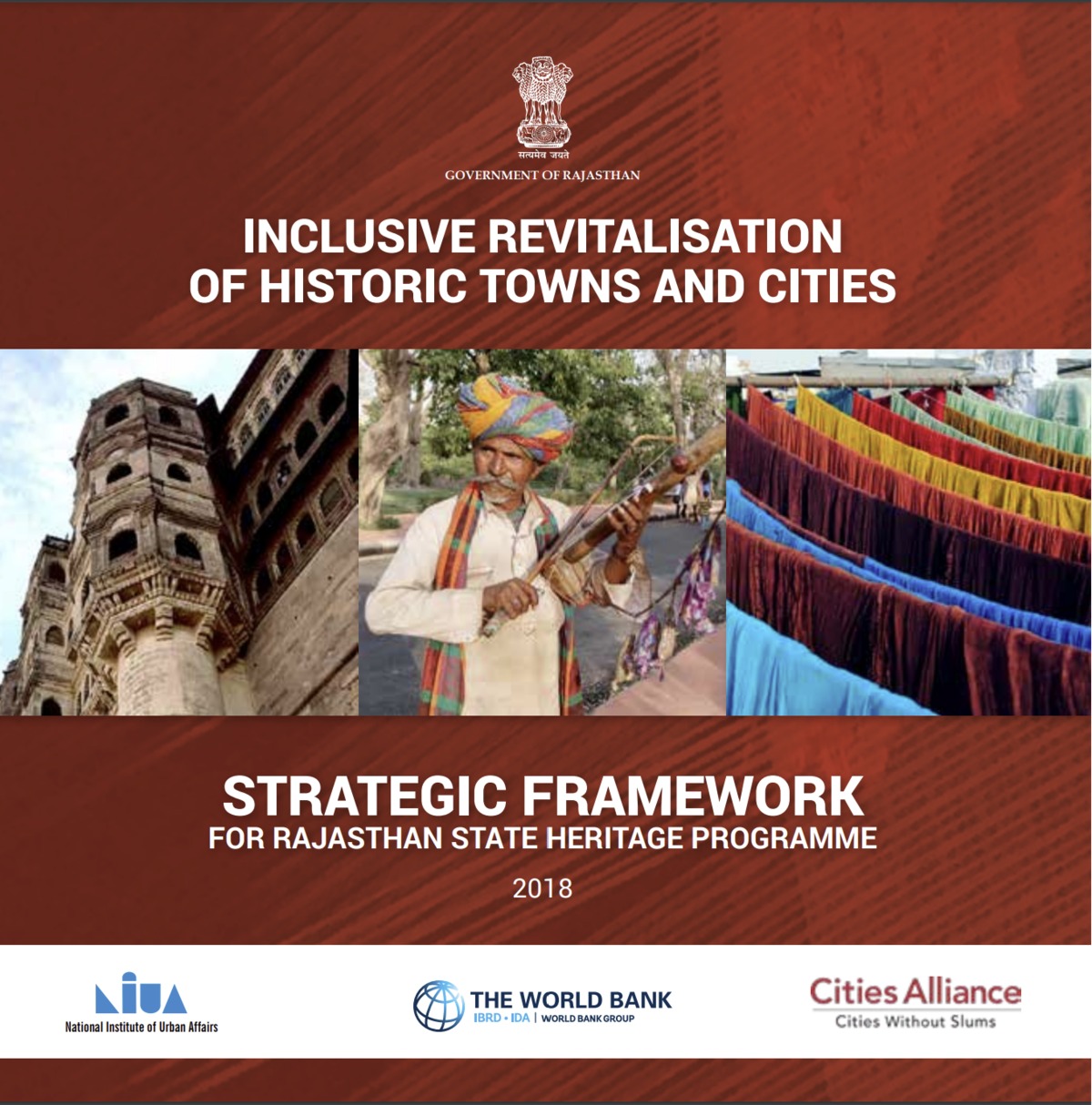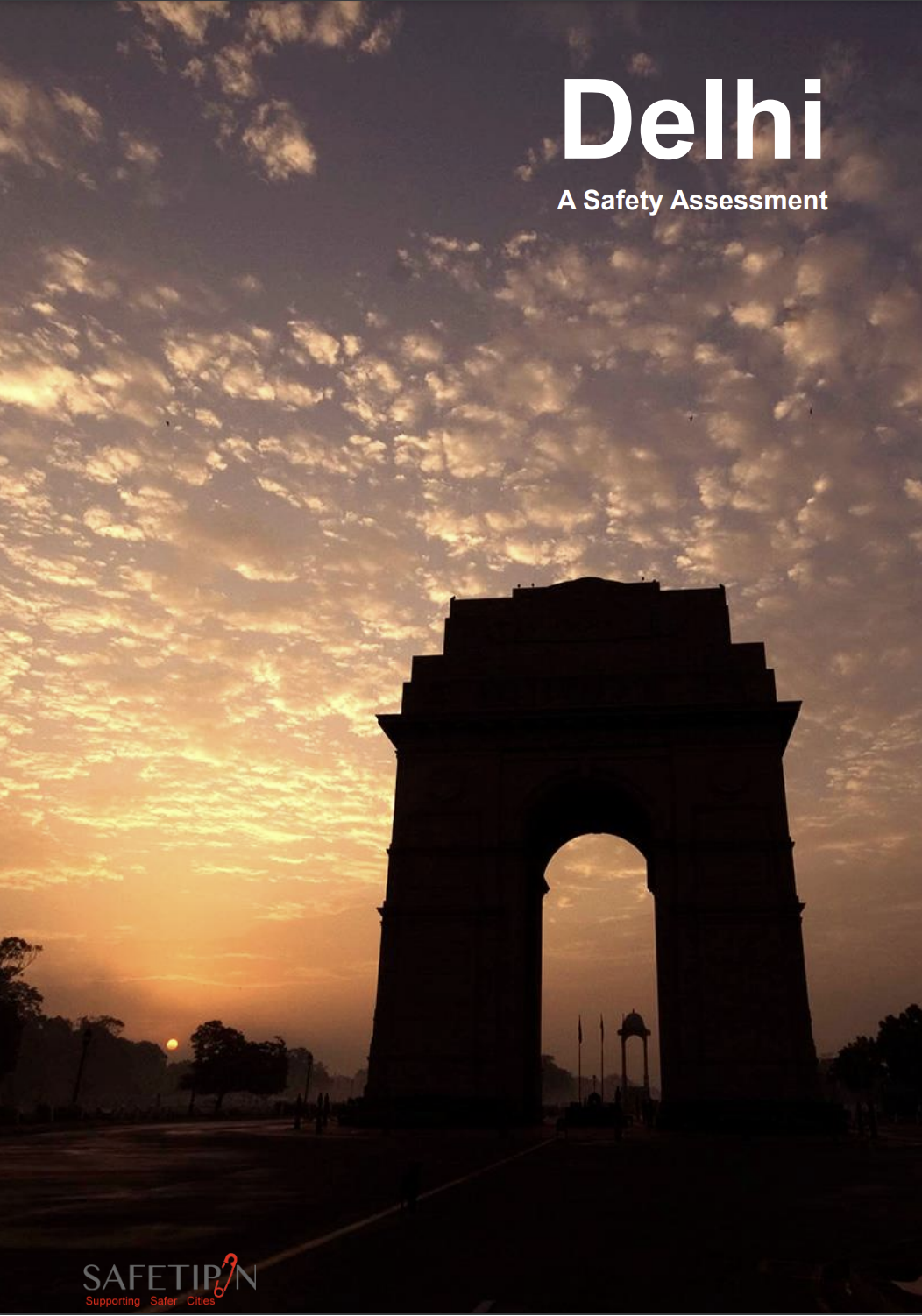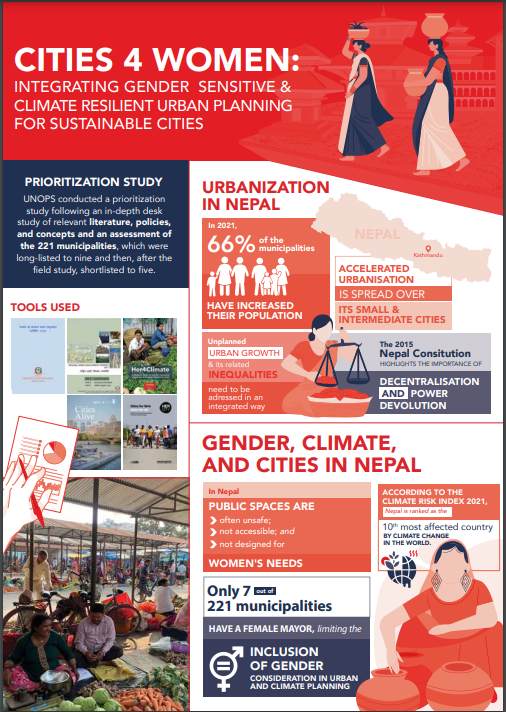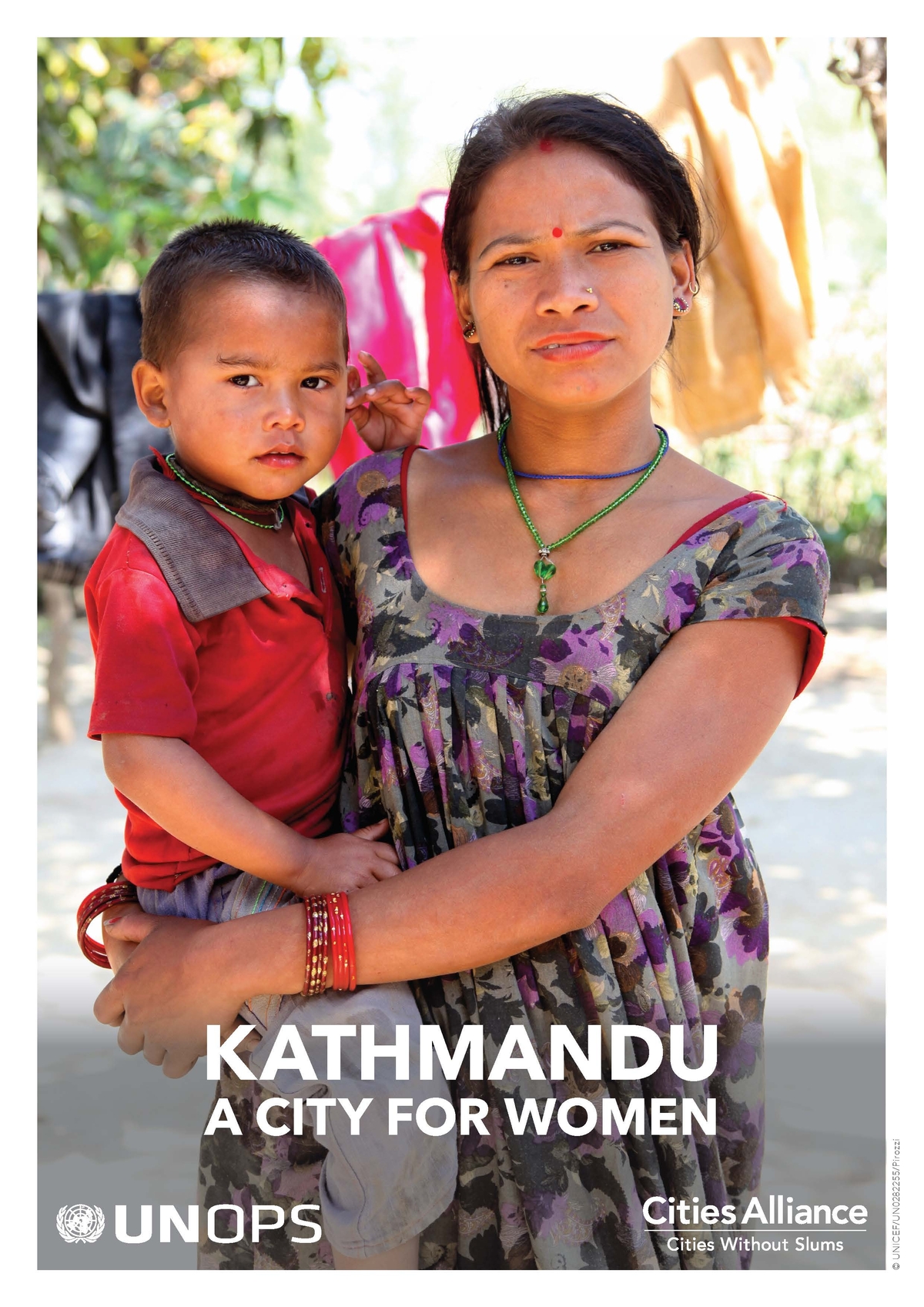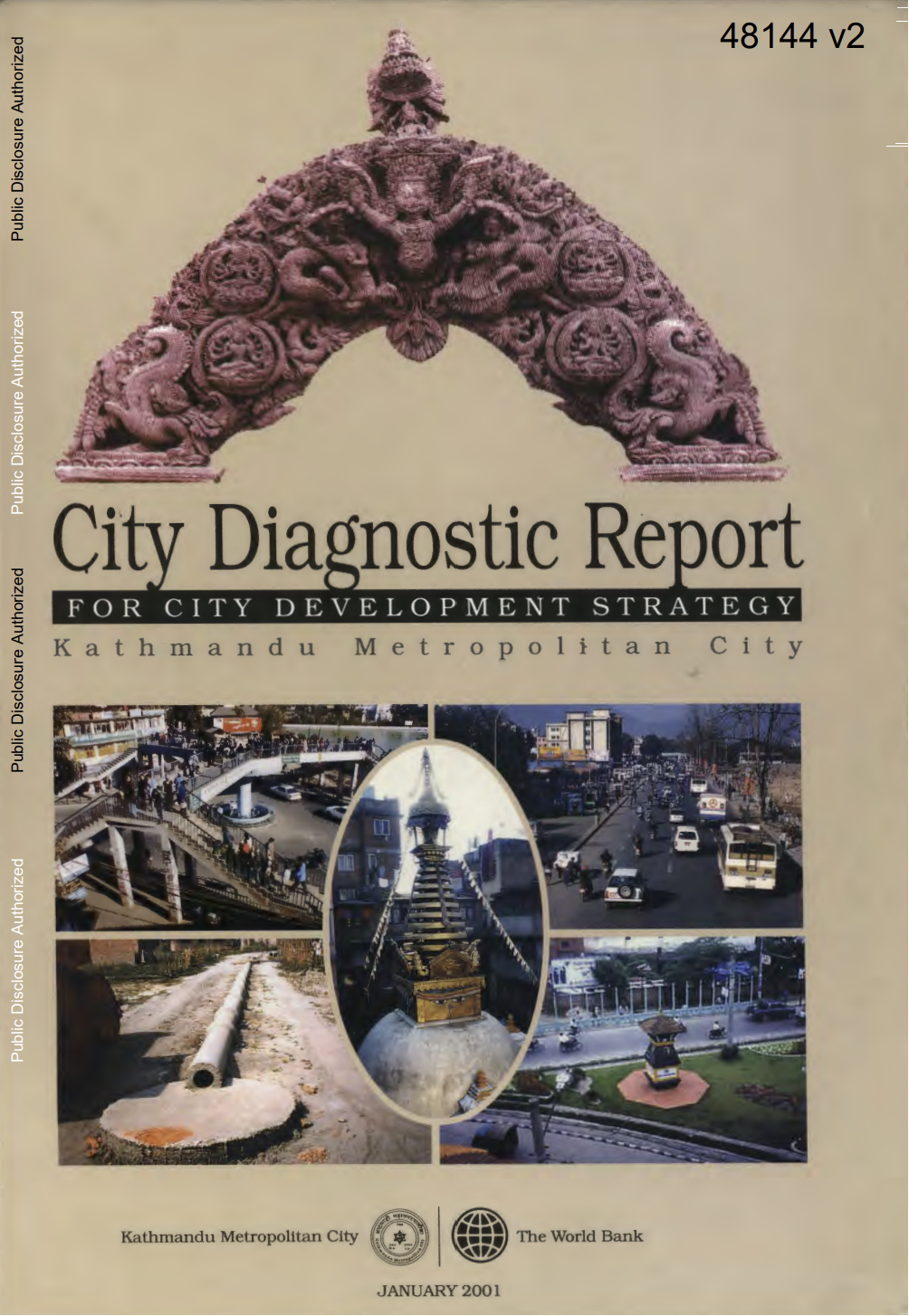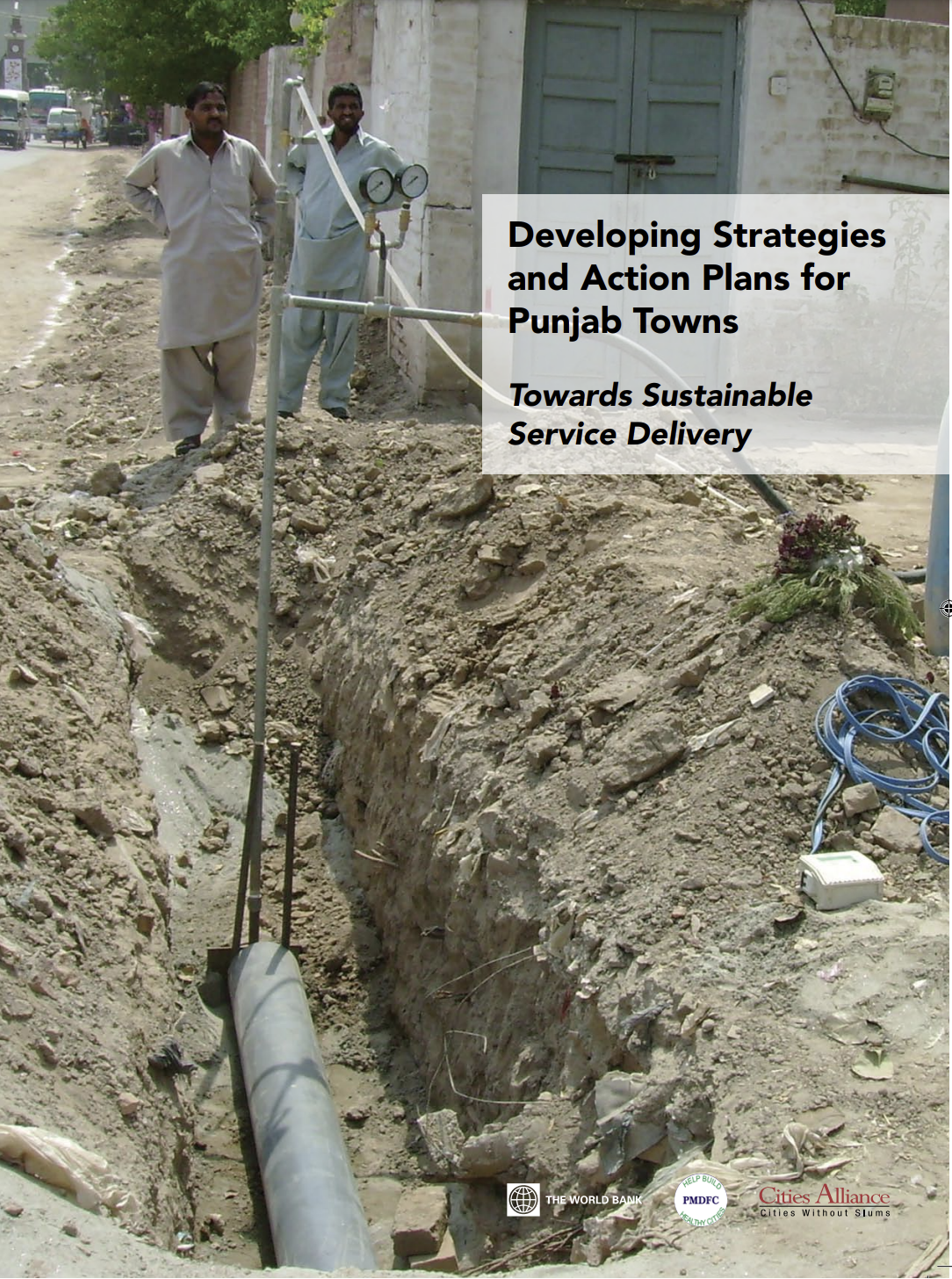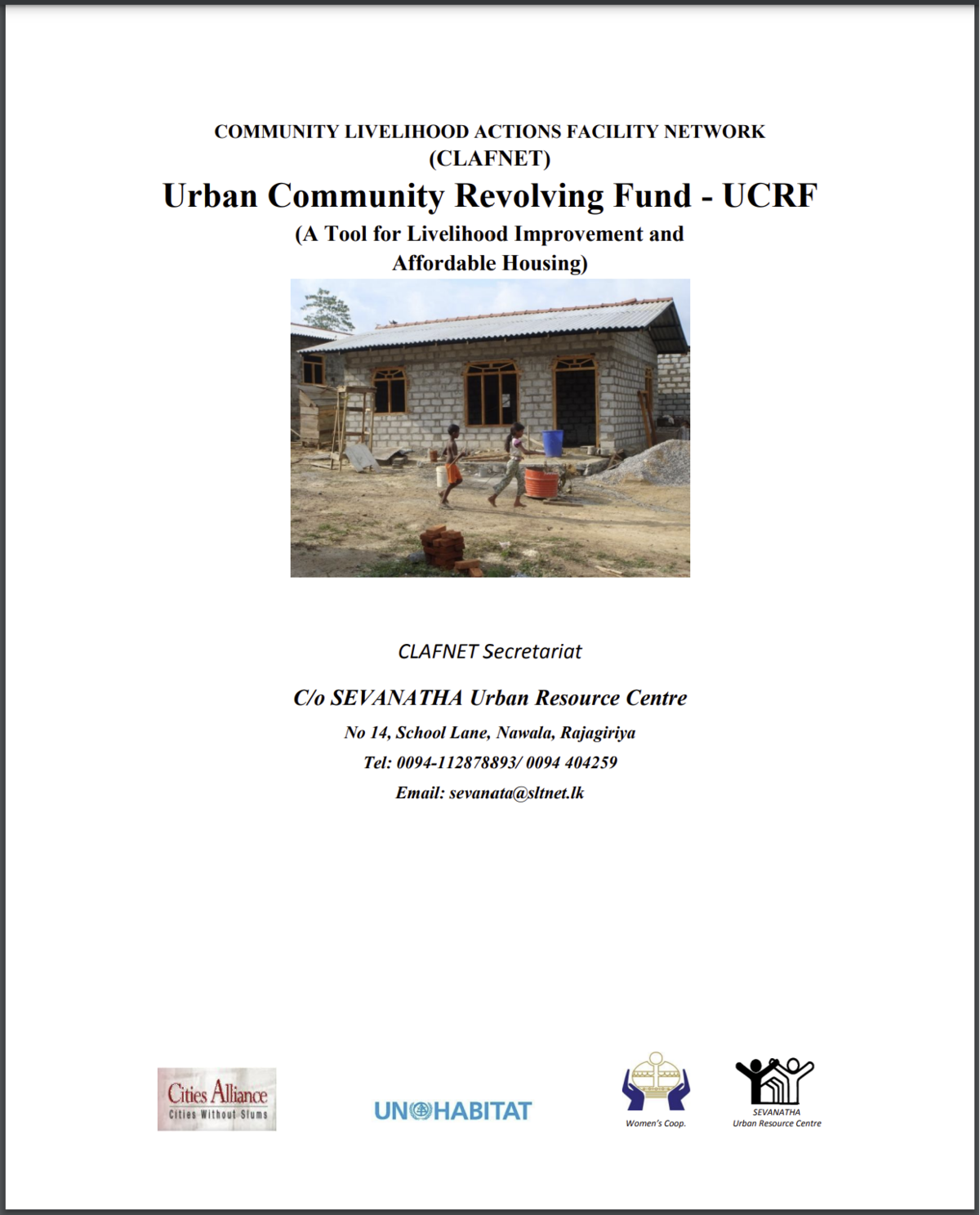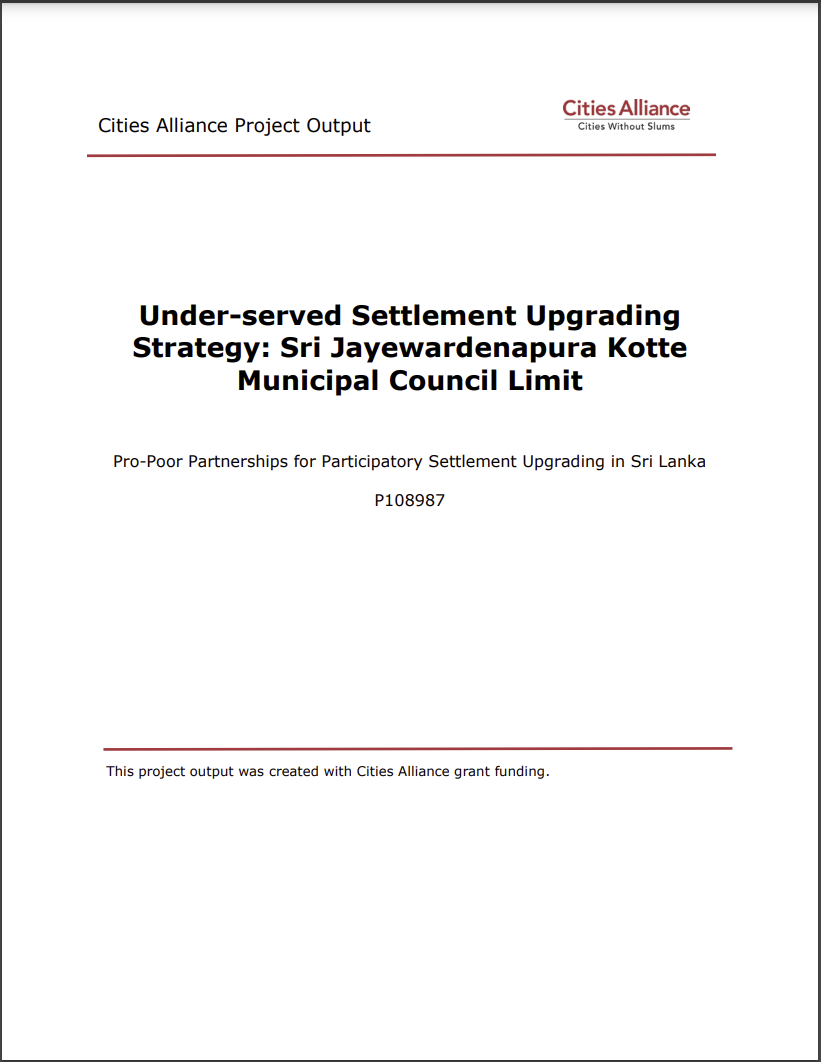Cities Alliance has worked in South Asia since 2000, beginning with a city development strategy for Kathmandu, Nepal. Over the past two decades, Cities Alliance projects and grants have supported more city development strategies, national and citywide urban upgrading plans, climate-resilient planning, and activities promoting gender equality.
We have provided technical assistance to local and national governments in Bangladesh, Bhutan, India, Nepal, Pakistan, and Sri Lanka.
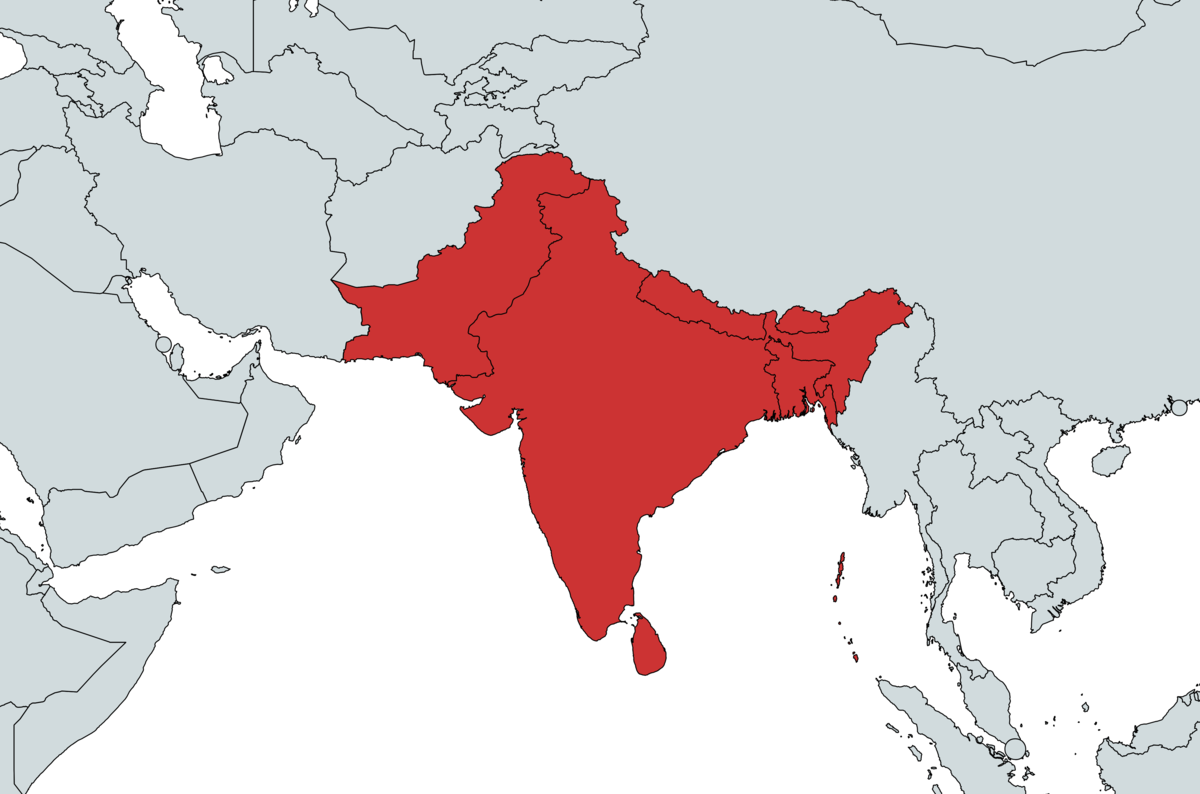
Cities for Women in Nepal
This project expands the successful gender-inclusive Femmedina approach piloted in Tunisia to Nepal. It aims to create climate-responsive and inclusive public spaces in five Nepalese municipalities by strengthening the systems that plan and implement municipal public infrastructure.
Launched in October 2023, the four-year project will be implemented in partnership with UNOPS Nepal, UN-Habitat, and the Ministry of Urban Development of Nepal in the municipalities of Sunwal, Tansen, Dhangadi, Birendranagar, and Chandragiri.
Operating at both national and local levels, it aims to boost the demand for gender-responsive, climate-resilient public spaces, produce tangible evidence through participatory public space projects, bolster municipalities' urban planning and design capabilities, and offer policy review recommendations by assessing the existing legal framework.
The project is funded by the EU Delegation in Nepal and will also act as a co-funding mechanism for financing medium-scale urban projects together with the selected municipalities.
Bangladesh
This project supported communities to improve climate resilience in the flood-prone Kuakata and Mongla port municipalities in Bangladesh.
For densely populated cities in coastal areas of the Bay of Bengal, the impacts of climate change are already a daily reality, while the threat of future climate-related emergencies is constantly on the horizon. The region has been affected by frequent cyclones, erosion, and sea-level rise, while saltwater has overflowed into communities, damaging soils, drinking water supplies, and livelihoods.
These climate-related impacts have been especially devastating for impoverished people, such as indigenous (Rakhine) families and women-headed households living in informal settlements, who are already more vulnerable to economic shocks.
This project supported Badabon Sangho, in cooperation with the Swedish International Development Cooperation Agency and the Cities Alliance Innovation Programme, to address these issues. It included community awareness and engagement sessions, training of youth for data collection, and mapping initiatives.
The geospatial maps and databases produced by the project will be used by local residents and elected bodies to develop climate-integrated resilience plans for the informal settlements. The databases may also be used to help resolve land tenure issues for indigenous and women-headed families.
As part of its Campaign Cities Initiative, the Cities Alliance Joint Work Programme for Equitable Economic Growth built on local partnerships in two secondary cities in Bangladesh to facilitate and inform a local dialogue with local authorities and stakeholders on how to foster equitable economic growth in the cities.
The initiative assisted the cities of Narayanganj and Sylhet in preparing evidence-based policy recommendations concerning how municipal public goods and services could be delivered in a manner that directly contributes to EEG.
In Narayanganj, the focus was on women’s economic empowerment and the digitalisation of municipal services. Sylhet prioritised the safe handling and disposal of waste from healthcare establishments for sustainable medical waste management.
In Bangladesh, the Campaign Cities Initiative was implemented from December 2016 to December 2018 by the BRAC Institute of Governance and Development (BIGD).
Dhaka receives approximately 300,000 to 400,000 migrants each year from different regions of Bangladesh due to various impacts of climate change. Most of these migrants lack education and skills suited to city life, and they are generally unfamiliar with their rights and entitlements. Many migrant women work as domestic workers – the most unprotected and vulnerable working class in Bangladesh.
The CityWorks activity provided skills training, employment matching through social enterprise, social safety, and financial services to unregistered domestic migrant workers in Bangladesh.
It took a four-pillar approach to ensuring rights and opportunities for domestic migrant workers: Mobilising migrant domestic workers in a formal platform; economic empowerment; citizen dialogue; and changing public mindsets through campaigning. The approach combines the work of setting up a social development company while promoting larger, structural changes by engaging active citizens to negotiate for more accountable governments.
CityWorks was sponsored by United Cities and Local Governments Asia-Pacific (UCLG ASPAC) and implemented by Oxfam.
By 2021, the 50th anniversary of its independence, Bangladesh seeks to attain middle-income status. To accelerate growth enough to do so, Bangladesh needs to build a competitive urban space that is innovative, connected, and livable.
Published in 2013, Bangladesh: The Path to Middle-Income Status from an Urban Perspective investigates the drivers and obstacles to creating a competitive urban space by focusing on one of the country's most successful industries: the garment sector.
In analysing a survey of 1,000 garment firms, this study reveals that Bangladesh's urban areas are falling behind in all three drivers of competitiveness - innovation, connectivity, and livability. Dhaka City, its capital, is the country's most productive location for garment firms. Yet, it is falling behind in accessibility and livability because of high congestion and severe constraints in its land and housing markets. And Dhaka City currently lacks the economic diversity that is expected in a metropolitan area of its size.
The study was funded by the Cities Alliance, the World Bank, and the World Bank-AUSAid Policy Facility for Decentralisation and Service Delivery.
Bhutan
Bhutan’s capital city of Thimphu sought to proactively address its rapid growth in a sustainable and environmentally sound manner, improve the quality of life of the growing urban population, and invigorate private sector development.
This project developed a policy framework for urban growth in Thimphu, with potential replication to other cities in the country. It also developed a national urban development strategy, established a basis for invigorating active private sector development, and drew up municipal financing plans.
India
This initiative provided support to the Mumbai Transformation Programme in two phases from 2005–2021.
Mumbai is one of the world's most densely populated metropolitan areas, and the strain on infrastructure and services has already lowered the quality of life and slowed down economic growth.
Seeking to reverse this decline, in 2003 a group of citizens began pressing for drastic infrastructure improvements and better planning and governance. They created a vision statement to transform Mumbai into a world-class city with a vibrant economy and a high standard of living for all citizens. This would require upgrading the slums in Mumbai from about 60 per cent to less than 15 per cent of the population.
The Mumbai Transformation Programme was established with over 40 projects to spur economic growth, reduce poverty and enhance the quality of life for residents, especially slum dwellers. The projects focused on physical and social infrastructure, environment, housing, governance, and strategic planning. They covered a wide range of activities, such as improvements to the city’s ageing transport infrastructure and better health, education and job training services for residents.
The Cities Alliance, the World Bank, and the U.S. Agency for International Development (USAID) supported the creation of the Mumbai Transformation Support Unit (MTSU) in 2005 to serve as an interface between the government and all other stakeholders
involved in the ambitious long-term programme. Its duties also included providing administrative and technical support and documenting the process.
Agra, India used a Cities Alliance grant to develop an inclusive city development strategy and a citywide slum upgrading plan based on hard data on the informal settlements.
The funding also allowed the city to launch two pilot projects: The Mughal Heritage Walk and a partial upgrading of the Kuchpura settlement.
Agra leveraged its grant to secure US$22 million in additional investments to improve the lives of slum dwellers.
This project supported the government of India with its national sanitation programme from 2003–2007.
When the government conceived its sanitation programme, the idea of public participation in sanitation provision was a relatively new concept. While national, state, and city governments provided financial support to construct toilets, the Cities Alliance's help was sought to develop a range of activities to demonstrate new ways of working with the poor.
Cities Alliance members and partners carried out detailed studies on existing approaches to slum and community sanitation. The results were widely disseminated among stakeholders, and the lessons learned from the experience were incorporated into sanitation strategies at all levels.
The project helped raise the profile of sanitation in India to the highest level, and in 2009 the government announced a National Urban Sanitation Policy (NUSP). It was India's first comprehensive urban sanitation policy that promised universal access with a focus on people living in underserved areas.
From 2012 to 2018, Cities Alliance and the World Bank provided technical assistance in support of India's Heritage City Development and Augmentation Scheme (HRIDAY).
Many urban historic areas are home to a large concentration of the urban poor, and this activity helps cities integrate cultural heritage with city development and local economic development in a way that brings better service and livelihood opportunities.
HRIDAY was designed to help cities integrate cultural heritage with city development and local economic development in a way that brings better service and livelihood opportunities.
Support for the initiative was implemented in two phases. During the first phase, the programme was piloted in three cities in the state of Rajasthan. The learning from the pilot cities was used to formulate urban revitalisation guidelines, which were adopted into the national Heritage Cities Development and Augmentation Scheme.
The second phase expanded the programme to 12 cities in India and working with the state governments of Karnataka, Odisha, and Rajasthan to develop heritage development programmes.
Safetipin takes a novel approach to filling data gaps and promoting public safety. It is a technology platform that makes communities and cities safer by providing safety-related information collected by users and trained auditors through an easy-to-use app.
The Cities Alliance supported Safetipin to upscale its technology from first engagements in India to large safety audits and reports in three cities: Bogota, Delhi, and Nairobi. Since then,
Safetipin has built on the pilot projects in Bogota, Delhi, and Nairobi to scale up their work to other geographic locations. Today, Safetipin is used by over 85,000 people in 12 cities, contributing to safer environments for women globally.
In 2018, Safetipin won the Dubai International Award for Best Practices and the Womanity Award, which recognises initiatives that protect women and girls around the world from gender violence.
Safetipin received funding through the Cities Alliance Innovation Programme.
This project supported development of a formal framework called urban metabolism to address sustainability and equity challenges associated with rapid urbanisation. The activity focused on water flows in Bangalore, building on previous work identifying key knowledge gaps in water demand and supply.
The BUMP project was a partnership between the Stockholm Environment Institute, the Indian Institute of Science, and the Indian Institute of Management. It was funded through the Cities Alliance Innovation Programme.
Cities Alliance supported the Peer Experience and Reflective Learning (PEARL) network from 2010–2013. In collaboration with the World Bank Institute (WBI), the project provided the technical know-how to transform PEARL into an effective horizontal learning network by strengthening the process of information exchange and developing need-based knowledge products.
PEARL provided capacity building through cross-learning and knowledge exchange on planning, implementation, governance, and sustainability of urban reforms and infrastructure projects among the 65 cities that were supported under India's massive Jawaharlal Nehru Urban Renewal Mission (JNNURM), the single largest urban development initiative in India’s history.
As part of the project, Cities Alliance supported documentation of good practices in various thematic areas related to planning, governance, and service delivery for use by the PEARL network.
This initiative supported the city of Hyderabad in developing an action plan for citywide upgrading of the city’s under-serviced settlements and a city development plan.
As a foundation for the process, the project conducted a comprehensive survey of all 950 informal settlements in the city. It designed a computerised information system with digitised maps of slums and data.
Based on this data, the infrastructure and resource requirements for comprehensive slum upgrading were identified. These were included in Hyderabad's city development plan with assistance from the Jawaharlal Nehru National Urban Renewal Mission (JNNURM).
Nepal
The Cities for Women Project in Nepal aims to create climate-responsive and inclusive public spaces in five Nepalese municipalities by strengthening the systems that plan and implement municipal public infrastructure.
Launched in October 2023, the four-year project will be implemented in partnership with UNOPS Nepal, UN-Habitat, and the Ministry of Urban Development of Nepal in the municipalities of Sunwal, Tansen, Dhangadi, Birendranagar, and Chandragiri.
Operating at both national and local levels, this project aims to boost the demand for gender-responsive, climate-resilient public spaces, produce tangible evidence through participatory public space projects, bolster municipalities' urban planning and design capabilities, and offer policy review recommendations by assessing the existing legal framework.
The project is funded by the EU Delegation in Nepal, and will also act as a co-funding mechanism for financing medium-scale urban projects together with the selected municipalities.
UNOPS Nepal and Cities Alliance supported local authorities' efforts to develop inclusive, gender-responsive urban plans in Nepal.
In collaboration with local institutions, this project implemented a women-focused participatory process, concentrating on the urban areas of Kathmandu Valley.
The project is documented in a report that collects women’s perceptions and experiences in the city (including accessibility, political representation, and use of public spaces) and highlights the need to take gender aspects into account in the design of public services.
It was implemented through the Cities for Women programme.
One of Cities Alliance's first CDS experiences, this project supported the development of a City Diagnostic Report for Kathmandu Metropolitan City (KMC), composed of ten sectoral chapters addressing a variety of key issues for the city.
The document formed the base for a City Development Strategy for Kathmandu that focused on urban poverty, improving livability, competitiveness, bankability, good governance, and management. The project also included a study of informal settlements in the Kathmandu Metropolitan area and a South Asia regional workshop on CDS.
The project was undertaken in partnership with the World Bank.
Pakistan
This project developed planning guidelines for four cities in Pakistan's Punjab Province (Chiniot, Gujranwala, Chakwal, and Pind Dadan Khan).
The guidelines identify steps to formulate a city vision, investment plans and development plans that are responsive to citywide and citizen priorities. They also define methodologies for monitoring local authorities’ performance that can be expanded to other local authorities in Punjab.
They stress the need for plans to be widely owned, for planning decisions to be based on an assessment of the existing situation, and for a holistic view of planning that takes social, institutional, financial, and physical factors and needs into account.
This project supported the Peshawar City District in the process of developing a city development strategy from 2001 to 2003.
The CDS activities were instrumental in supporting the restructuring process of the Peshawar City District government, introducing participatory approaches for the development of a common vision and development strategy, and helping city officials to identify the strengths and weaknesses of various Peshawar City District agencies and how to improve the cooperation between them.
The CDS was split into two volumes.
Sri Lanka
This initiative supported the government of Sri Lanka to institutionalise participatory urban governance approaches and assist selected Municipal Councils to consolidate and institutionalise participatory urban management mechanisms in preparation for upgrading action plans for large-scale settlements.
As a result of the project:
- Three cities developed slum upgrading strategies (NuwaraEliya, Batticaloa and Ratnapura)
- A component on good governance was adopted as part of a national policy for local government
- Urban Governance Facility Units (UGFC) were established in the Ministry of Provincial Councils and Local Government to provide support, technical advice, and assistance for local governments.
- Shelter Profiles were produced for all participating cities


